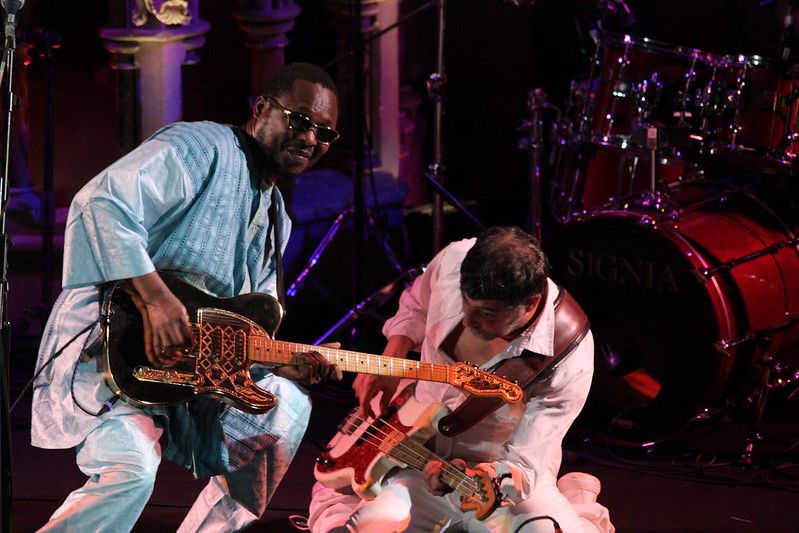Amadou Bagayoko: The End of a Malian Melody That Conquered the World

Yesterday, on April 4, 2025, Amadou Bagayoko, guitarist and singer of the renowned Malian duo Amadou & Mariam, passed away at 70 after a period of illness. His death marks the end of an extraordinary musical journey that spanned more than four decades and left an indelible mark on the global music scene.
The encounter that would change the music world
The story of Amadou & Mariam began in 1974, when 21-year-old Amadou Bagayoko met 18-year-old Mariam Doumbia at the Malian Institute for the Blind in Bamako. Both shared a deep love for music — he as a guitarist, she as a singer. They quickly discovered their shared musical interests, and what began as a personal connection blossomed into one of Africa’s most influential musical collaborations.
Since 1980, they had been performing together — first in Africa, and from 1985 onwards in France and at world music festivals across the globe. Their musical style, which they described as “afro-blues,” combined traditional Malian music with Western influences such as rock guitar, but also incorporated elements from various cultures: Cuban trumpets, Colombian trombones, and Indian tablas.
Global breakthrough
The duo’s international breakthrough came in 2004 with the album Dimanche à Bamako, produced by Manu Chao. The lead track, “Beaux Dimanches,” became a worldwide hit and opened the doors to a much wider audience. Their unique sound and captivating performances led them to the world’s biggest stages.
Their impressive career included collaborations with artists like Damon Albarn of Blur and Gorillaz, performances with Coldplay, U2, and Stevie Wonder, and even a performance for Barack Obama during the ceremony for his Nobel Peace Prize in 2009. They composed the official song for the 2006 FIFA World Cup in Germany and performed at the closing ceremony of the Paris Olympic Games in 2024, where they delivered a poignant rendition of “Je suis venu te dire que je m’en vais” by Serge Gainsbourg — a song that now takes on a painful new meaning.
A recent triumph in Brussels
Just a year ago, on March 28, 2024, the duo gave a memorable concert at a sold-out Ancienne Belgique in Brussels. As a music journalist, I had the privilege of reviewing that concert for Maxazine — an experience that now takes on special significance in light of Amadou’s passing.
In my review, I described how the duo captivated the audience from the very first notes. The evening turned into what I called a “legendary concert,” with a remarkable “synergy” between the band and the crowd. What struck me most was the surprising discovery that behind Amadou’s warm and charismatic personality lay an exceptional guitar talent, which he fully revealed during a fiery solo interlude.
Cultural impact
The cultural impact of Amadou & Mariam goes far beyond music. As the “blind couple from Mali,” they brought attention to the challenges faced by blind and disabled people. Their success pushed boundaries and shattered stereotypes.
Their music was not only innovative in its fusion of styles but also in the powerful messages carried in their lyrics. They told stories of love, loss, and universal human experience while also addressing social themes, such as migration in their song “C’est Chaud” — a track about people leaving their homelands in search of a better life.
Shock in the music world
Amadou’s passing has sent waves of emotion through the music world. Manu Chao, who closely collaborated with the duo, reacted on Instagram: “Amadou! We will always be together… With you wherever you go. Mariam, Sam, the whole family, your pain is my pain. I love you.”
Mathieu Sabarly, director of the Rencontres et Racines festival in Audincourt, where the duo was scheduled to headline in June, also reacted with shock: “We didn’t expect this at all — it’s a shock. I didn’t know Amadou was ill. The first thing that comes to mind is sadness.”
A lasting legacy
Amadou Bagayoko leaves behind a rich musical legacy. With Mariam, he sold millions of albums worldwide and received numerous accolades, including a Grammy nomination in 2010 and awards from BBC Radio and the Victoires de la Musique in France.
His signature “cascading” guitar sound and the danceable rhythms of their music have left an undeniable imprint on world music, succeeding like no one else in transcending cultural boundaries and bringing people together through the universal language of music.
Amadou Bagayoko is survived by his wife Mariam, three children, and fans across the world who will continue to cherish his music as a source of joy and inspiration.
In the words he so often sang with Mariam in “Beaux Dimanches”: Sundays in Bamako will never be the same again — but the music and the memory will live on.
![]()




